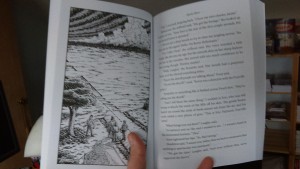It’s been a really busy month. FreeBSD Mastery: Specialty Filesystems came out, as did my BSDNow interview about it. About a month ago I released my new crime novel, Butterfly Waltz Stomp. And the new Immortal Clay novel, Kipuka Blues, officially landed yesterday. I’d planned to blog about the novel release, but Wayne County decided that they needed me to spend the day in the Juror Lounge, waiting for my name to be called so an attorney could look at me and say “Oh, hell no, get out of here.”
But I’m not going to write about any of that.
Instead, I’m going to talk about bundling. Specifically, book bundling.
A book bundle is where a bunch of authors to combine one of their books in a single package. The books share a theme, and the authors are similar enough that each reader’s fans will probably enjoy the others work.
And bundles are cheap. You can get, say, five books for $5, and twelve books for $12.
Anyone can do a bundle, but you really can judge a bundle by the quality of its authors. A bundle starring Yawny McBlech and Tedium Snores isn’t exactly impressive.
Being in a bundle with authors like, say, Michael Stackpole means your work has a certain level of quality. I mean, Stackpole wrote the book that will become the first standalone Star Wars film. That would be cool. I mean, they don’t let just any yahoo write Star Wars. You have to be a very special yahoo.
Or Kris Rusch, who’s written a slew of excellent, enjoyable, and award-winning novels. Plus, she’s won separate Hugo awards for both her fiction and her editing. If you get to hang out with her, you’re in good shape.
Chilling with Dean Wesley Smith, who’s been on the USA Today best-seller list so often that he’s lost count, is probably a good sign.
You don’t have to hang with award winners to be okay, though. There’s people like Anthea Sharp and Mindy Klasky, who aren’t as well-known as Stackpole or Rusch or Smith, but have made their own marks on the best-seller lists.
And authors like Leah Cutter and Blaze Ward and Sherry D Ramsey and Daniel Keys Moran have been around long enough to build a trajectory. That trajectory: is up.
These are the people you want to be bundled with.
And… apparently… me.
In the Middlings Sampler, I got invited to hang out with the cool kids.
The Middlings Bundle is stuff that isn’t quite one thing or the other. The tales are too long to be short stories, but too short to be novels. They’re maybe SF, or fantasy, or some weird thing in between.
And they’re all set in between things. Heaven and Hell. Earth and Fairyland. Planets and stars. Or, in my case, neutronium and nonexistence.
This is a “pay what you think it’s worth” bundle. For a paltry $5, you get:
- How to Babysit a Changeling by Anthea Sharp
- Forever Falls by Michael Warren Lucas (me! me! me!)
- As Needed by Michael A. Stackpole
- Heaven Painted as a Cop Car by Dean Wesley Smith
- Siren by Blaze Ward
For a mere $12 you’ll get:
- Fly Me to the Moon by Mindy Klasky
- Walking Gods by Leah Cutter
- The Possession of Paavo Deshin by Kristine Kathryn Rusch
- Waiting to Fly by Sherry D. Ramsey
- Old Man by Daniel Keys Moran
- A coupon for two free books from Kobo: Collateral Damage by Mark Leslie, and A Bird in the Hand by Douglas Smith
Go check out the Middlings Sampler.
Some questions and answers on the bundle.
Q: How did you get to be part of this?
A: Either I plied Cutter with strong liquor until she succumbed to my pleas for inclusion, or she suffered an astonishing lapse of judgment and invited me. Your choice.
Q: Why push this, instead of your brand-new novel?
A: I’m going to push the novel. Soon. But the Middlings Sampler has an expiration date. Get it by the 25th of April… or NEVER.
Q: Twelve books for $12 doesn’t sound like much. Gimme something else.
A: All right, fine. Ten percent of the proceeds go to support the Washington Talking Books and Braille Library. You need to select that option at checkout, though.
Q: Really, why should I take a look?
A: Because if you don’t at least peek at the Middlings Sampler, the cool kids won’t want to hang out with me any more. And I’ll get really depressed and isolative. More depressed and isolative, I mean. Yes, there’s room for me to be more of both. Really.
Q: If I pay what I think it’s worth, I have to pay more than $12. Can I do that?
A: Yep. There is no upper limit on how much money you can give us.
Q: The Middlings Sampler launched the same day as Kipuka Blues. How did you cope with a bundle coming out on new novel day?
A: I went to jury duty. Where I was not allowed electronics, or anything battery-powered, or dental floss. The fact that they did not have to clean my brain off the ceiling was a miracle.
Q: Seriously, though: what about the new novel?
A: Kipuka Blues. The sequel to Immortal Clay. It’s a play off of Invasion of the Body Snatchers or The Thing, set after we lose. We are the pod people. I’ll post more about KBlater, once there’s a review somewhere or there’s a hint that someone actually read the dang thing.
So, in the Middlings Sampler. I’m hanging out with people who write Star Wars! That is totally cool, although I do have to say, Star Trek is better. No, wait–Smith and Rusch both wrote Star Trek as well.
For this one glorious moment, I am a mere two degrees of separation from the absolute pinnacle of Western civilization. I could fall forever from here…

 As with the Mastery books, I’ve tried to make the Kipuka Blues a physical artifact worth owning. It’s by far the thickest book I’ve published, roughly twice the size of any FreeBSD Mastery book.
As with the Mastery books, I’ve tried to make the Kipuka Blues a physical artifact worth owning. It’s by far the thickest book I’ve published, roughly twice the size of any FreeBSD Mastery book.
